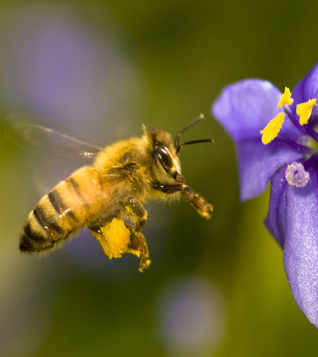Columnists
The Honey Bee
The Way of The Sikh
Letter & Spirit # 40
YUKTANAND SINGH
Translated from Bhai Vir Singh's ‘Gurmukh Sikhia’
Part XXV-D
Everyone fears death. No one knows how the end is going to be … and we all have to go some day. But whatever happens, happens; we simply need to continue naam simran.
The story goes: When the student of a fakir (mendicant) died, the agents of death came and surrounded him.
The fakir asked, “Why are you grabbing him?”
“We pick up rubbish”, the agents of death said.
The fakir said, “That is okay. But this rubbish was from my back-pack. It is outside your jurisdiction. Leave him and go away!”
* * * * *
If we are more established in simran this year than we were last year, only then can we claim that we are progressing.
We can encounter loss while trying to help others. We need to act within our limits.
There was a very noble lady from Europe. She worked so hard for others that she died from contracting tuberculosis. She did not realize her own limitations.
Gurbani teaches us this wisdom: “One must act according to one’s strength and thus not lose one’s power” [GGS: 679.14].
When simran cleanses our mind, our mind then becomes kind and sensitive and it starts to empathize with the pain of others. But we need to appreciate nature’s drama. Someone may be feeding and nurturing the pigeons while another may be casting a net and mercilessly suffocating the fish. Each organism is prey to another as its predator.
If some parasites infest a cow’s wound, we use medicine to kill them. If we don’t, the cow dies. We cannot go to the extremes as the followers of Jainism do. They do not kill even lice. Rather, some of them populate garments with lice and pay someone to wear them and sleep with hands and feet tied so that the lice could feed freely!
* * * * *
It is difficult for a mother to raise too many children.
Many people come and bow to a sadhu (monk) but if this sadhu abides in a rajasik (worldly, action-oriented) state of mind and does not feel responsible for them, then the teacher and his students, both will be quite happy. But a God-fearing man cannot do so.
I want to have only as many children as I can nurture responsibly.
* * * * *
“One whose heart agrees with naam, O Nanak, he gets to know the immaculate Lord” [GGS:281.11].
A honeybee sits on the flower. It is quiet for a short while as long as it sits on the flower for the nectar. As soon as it gets off the flower it starts buzzing and keeps circling around it.
Similarly, a connoisseur of naam continues with simran even when his attention is turned away from the Lord, the owner of naam. This is the practice of living constantly thirsty for one’s master.
Just like the honeybee, we must stay close to Waheguru and we must not allow the long distance created by forgetting Him. The essence of all guidance is to maintain this contact.
My heart has been comforted by repeating ‘Waheguru-Waheguru’ and for this reason I tell everyone else to do the same. Simran of Waheguru relieves pain, and furthermore, it averts future suffering.
There is a couplet by Hafiz where a student asks this from his teacher: ‘When you drink liquor, spill some on the dirt too. Loss is also good sometimes, as someone else may gain from it’.
Hafiz calls himself dirt. Naam is the liquor here.
* * * * *
“A being who dwells day and night on the Lord is an embodiment of the Lord. There is no difference between the Lord and his servant; know this as truth, O Nanak” [GGS:1427.19].
“A man with simran of the Lord residing in his heart is a liberated being. There is no distance between such a human and the Lord; know this as truth, O Nanak” [GGS:1428.14].
With naam, our faculty of discrimination will become elevated and pure. Naam purifies us. It also makes us kind-hearted. But we need to learn how to endure this.
In the end, naam takes us to its owner. We need to learn how to tolerate. All the rewards of naam mentioned in Guru Granth Sahib are true. But we will realize them only when we reach higher levels of naam simran.
We must not be discouraged easily. Someone who continues naam simran accumulates its power. Thus, someone who enjoys the taste of naam simran, his advice to others to do the same is much more effective.
February 27, 2014
Conversation about this article
1: Baldev Singh (Bradford, United Kingdom), February 27, 2014, 7:01 PM.
I love naam simran and the shabads which are sometimes sung in a style which gives way to ecstasy like no other ecstasy, of any kind. You learn through the Guru's teaching about one word and that word is love! And ultimately if that love is for the Creator then like two lovers know that the other loves them and has no desire or devices to leave them or love someone else, so will be the love between the mortal, the imperfect being, and the Being which willed him or her into existence on this planet for the game of life!
2: Ajit Singh Batra (Pennsville, New Jersey, USA), March 02, 2014, 3:10 PM.
Naam simran means love for God. We human beings who have the power to perceive only through our senses, emerge from Him and in time to come shall blend again with Him. Human beings are like sparks of a fire. Sparks arise and in rising remain separate and yet they again merge in the same fire.



